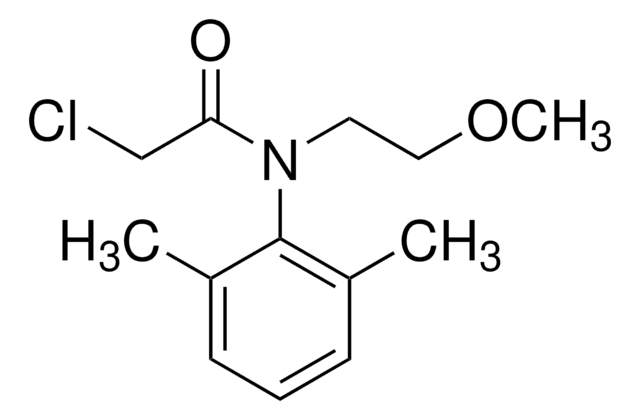46158
Dapsone
VETRANAL®, analytical standard
Synonym(s):
4-Aminophenyl sulfone, 4,4′-Diaminodiphenyl sulfone, 4,4′-Sulfonyldianiline, Bis(4-aminophenyl) sulfone, DDS, Dapsone
About This Item
Recommended Products
grade
analytical standard
Quality Level
product line
VETRANAL®
shelf life
limited shelf life, expiry date on the label
technique(s)
HPLC: suitable
gas chromatography (GC): suitable
mp
175-177 °C (lit.)
application(s)
cleaning products
clinical
cosmetics
food and beverages
forensics and toxicology
personal care
pharmaceutical (small molecule)
format
neat
SMILES string
Nc1ccc(cc1)S(=O)(=O)c2ccc(N)cc2
InChI
1S/C12H12N2O2S/c13-9-1-5-11(6-2-9)17(15,16)12-7-3-10(14)4-8-12/h1-8H,13-14H2
InChI key
MQJKPEGWNLWLTK-UHFFFAOYSA-N
Looking for similar products? Visit Product Comparison Guide
General description
Application
Legal Information
Signal Word
Danger
Hazard Statements
Precautionary Statements
Hazard Classifications
Acute Tox. 4 Oral - Aquatic Chronic 2 - Repr. 1B - STOT RE 2 - STOT SE 2
Target Organs
Blood, Blood,spleen,Liver
Storage Class Code
6.1C - Combustible acute toxic Cat.3 / toxic compounds or compounds which causing chronic effects
WGK
WGK 3
Flash Point(F)
Not applicable
Flash Point(C)
Not applicable
Personal Protective Equipment
Choose from one of the most recent versions:
Already Own This Product?
Find documentation for the products that you have recently purchased in the Document Library.
Customers Also Viewed
Our team of scientists has experience in all areas of research including Life Science, Material Science, Chemical Synthesis, Chromatography, Analytical and many others.
Contact Technical Service















